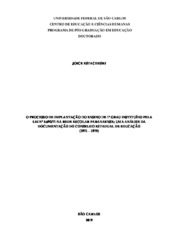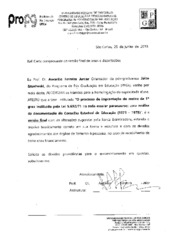| dc.contributor.author | Estacheski, Joice | |
| dc.date.accessioned | 2019-09-27T12:25:43Z | |
| dc.date.available | 2019-09-27T12:25:43Z | |
| dc.date.issued | 2019-03-29 | |
| dc.identifier.citation | ESTACHESKI, Joice. O processo de implantação do Ensino de 1º grau instituído pela Lei n° 5.692/71 na rede escolar paranaense: uma análise da documentação do Conselho Estadual de Educação (1971-1975). 2019. Tese (Doutorado em Educação) – Universidade Federal de São Carlos, São Carlos, 2019. Disponível em: https://repositorio.ufscar.br/handle/ufscar/11898. | * |
| dc.identifier.uri | https://repositorio.ufscar.br/handle/ufscar/11898 | |
| dc.description.abstract | This is a quali-quantitative study based on documental research aiming at analyzing historically the implementation process of elementary schooling instituted by the Law nº 5.692 of 11th August 1971, with the purpose of understanding the historical conditions in which it was enacted in the State of Paraná. The analysis was carried out through the study of Technical Opinions by the Education State Council, issued after assemblies held between 1971 and 1975. Since the Military Government Education Reform, instituted by the 1964 civilian-military coup, enabled the extension of mandatory schooling from 7 to 14 years old, it included legally great part of the population in the institutional formal education process. A legal right that, up to that moment did not assist many of the individuals in the Brazilian society as a whole, therefore, it was necessary to investigate the quantitative relations in which this process was developed. It is a fact that the capitalist production mode, as well as the social organization resulting from it, determines public policies in general. Thus, we sought to understand the historical context in which the civilian, military coup occurred, and the consequent need to establish a new teaching organization, since the government system instituted through agreements with the United States of America aimed, through the education process, to qualify workforce for the expansion of the industrial development in Brazil. Enlightened by Fernandes (2005), Ianni (1984), and Alves (1984), we sought to establish the historical constitution of the Brazilian elite, to evidence their interests towards the State organization and the need to promote the civilian-military coup of 1964 and, consequently, their actions regarding the Education Reforms. Therefore, by carrying out the historical analysis of the education policy created, based on Saviani (2008), Cunha and Góes (1991), and Germano (1993), we evidenced the relations between the politics structured at the time and the urgent need of reforms to guarantee viable strategic conditions to the “national development”. Taking into consideration the strong influence of the Human Capital Theory in the structure of the national education project, we analyzed that concept based on Schultz’s ideas (1973) which were incorporated to the political discourses and to the individuals’ formal education process from the 5th year of elementary school on, when the right to mandatory 8 years of schooling were instituted aiming at qualifying those individuals to the job market, directing them to a compulsory professionalization, and how this project influenced other forms of the school organization, such as teachers’ education and the structural, physical and material conditions of the schools in Paraná. This research collaborates with the academic field, mainly regarding education policies in the history of Brazilian education for pointing out that, even if those policies have been put forward as attainment of rights, in this specific case, the access to eight years of schooling, the capitalist structure led the education process so that it would remain focused on the interests of the elite, since, as a general rule, public education and schooling were destined to the children of the working class, they were established only under precarious conditions, consequently limiting those students access to culture and scientific knowledge. | eng |
| dc.description.sponsorship | Não recebi financiamento | por |
| dc.language.iso | por | por |
| dc.publisher | Universidade Federal de São Carlos | por |
| dc.rights | CC0 1.0 Universal | * |
| dc.rights | Attribution-NonCommercial-NoDerivs 3.0 Brazil | * |
| dc.rights.uri | http://creativecommons.org/publicdomain/zero/1.0/ | por |
| dc.subject | Implantação do 1º grau no Paraná | por |
| dc.subject | Reforma de Ensino de 1971 | por |
| dc.subject | Educação e Ditadura civil-militar no Brasil | por |
| dc.subject | Implementation of elementary school in Paraná | eng |
| dc.subject | 1971 Education Reform | eng |
| dc.subject | Education and civilian-military dictatorship in Brazil | eng |
| dc.title | O processo de implantação do Ensino de 1º grau instituído pela Lei n° 5.692/71 na rede escolar paranaense: uma análise da documentação do Conselho Estadual de Educação (1971-1975) | por |
| dc.title.alternative | Elementary schooling implementation process through the creation of the law nº 5.692/71 in the Education System in Paraná State: an analysis under the light of the Education State Council (1971 – 1975) | eng |
| dc.type | Tese | por |
| dc.contributor.advisor1 | Ferreira Junior, Amarilio | |
| dc.contributor.advisor1Lattes | http://lattes.cnpq.br/0748545841167046 | por |
| dc.description.resumo | O presente estudo apresenta-se sob o caráter quali-quantitativo, caracterizando-se como pesquisa documental com o objetivo de analisar historicamente o processo de implantação do ensino de 1º grau instituído pela Lei nº 5.692 de 11 de agosto de 1971, a fim de compreender as condições históricas em que o mesmo se efetivou no Estado do Paraná. A análise em questão se deu por meio da seleção e estudo dos Pareceres do Conselho Estadual de Educação, emitidos após plenárias nos anos correspondentes entre 1971 e 1975. Tendo em vista que a Reforma de Ensino do Governo Militar, instituída pelo golpe civil-militar de 1964, possibilitou a ampliação da escolarização obrigatória dos 7 aos 14 anos de idade, ou seja, legalmente incluiu uma grande parcela da população ao processo de educação formal institucional, direito que até então não se estendia à maioria dos sujeitos da sociedade brasileira como um todo, coube-nos, estabelecer as relações quantitativas em que tal processo se efetivou. É fato que o modo de produção capitalista, bem como a organização social que desse modo advém, determina as políticas púbicas de modo geral. Sendo assim, buscamos compreender o contexto histórico em que se deu o golpe civil-militar, e a consequente necessidade em se estabelecer a nova organização do ensino, uma vez que o sistema de governo instituído, por meio de acordos estadunidenses objetivavam, via processo educacional, a qualificação interessada para a ampliação do desenvolvimento industrial no Brasil. À luz de Fernandes (2005), Ianni (1984), Alves (1984), buscamos estabelecer a constituição histórica da elite brasileira a fim de evidenciar seus interesses voltados à organização do Estado e da necessidade da organização do golpe civil-militar de 1964 e, consequentemente, as suas ações diante das Reformas de Ensino. Dessa forma, sob a análise histórica da política educacional instituída, fundamentando-se em Saviani (2008), Cunha e Góes (1991), Germano (1993), evidenciamos as relações entre a política então estruturada e a necessidade iminente das reformas a fim de se garantir as condições estratégicas possíveis ao “desenvolvimento nacional”. Tendo em vista a forte influência da Teoria do Capital Humano na estruturação do projeto de educação nacional, analisamos tal concepção diante das assertivas de Schultz (1973) que se incorporaram nos discursos políticos e no processo de educação formal dos sujeitos desde a 5ª série do Ensino de 1º Grau, quando se instituiu o direito aos 8 anos de escolarização obrigatórios com o intuito de vocacioná-los para o trabalho direcionando-os, posteriormente, à profissionalização compulsória, de modo a também refletir nas demais formas de organização escolar, tais como a formação de professores e as condições estruturais, físicas e materiais das escolas paranaenses. A pesquisa colabora para o campo acadêmico, principalmente ao que tange às políticas educacionais na história da educação brasileira no sentido de denunciar que, ainda que tais políticas nos sejam apresentadas como conquista de direitos, no caso, o acesso à educação de oito anos, a estrutura capitalista conduz o processo educacional de modo que este permaneça voltado aos interesses da elite, uma vez que, como via de regra, a educação e a escola pública, as quais se destinam aos filhos da classe trabalhadora, se estabelecem apenas sob precárias condições limitando o acesso à cultura e ao conhecimento científico. | por |
| dc.publisher.initials | UFSCar | por |
| dc.publisher.program | Programa de Pós-Graduação em Educação - PPGE | por |
| dc.subject.cnpq | CIENCIAS HUMANAS::EDUCACAO::TOPICOS ESPECIFICOS DE EDUCACAO | por |
| dc.publisher.address | Câmpus São Carlos | por |
| dc.contributor.authorlattes | http://lattes.cnpq.br/5670780017794373 | por |


